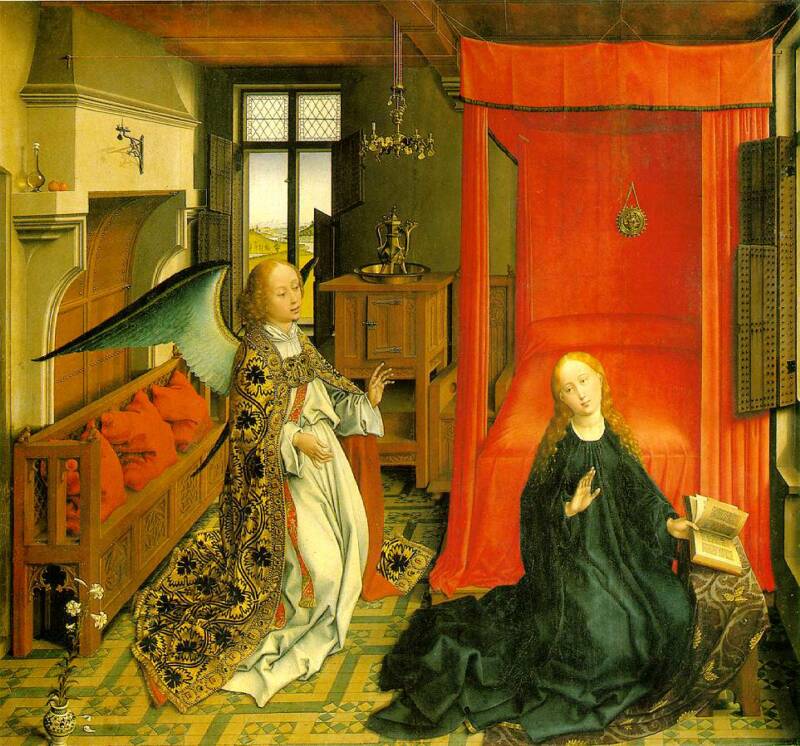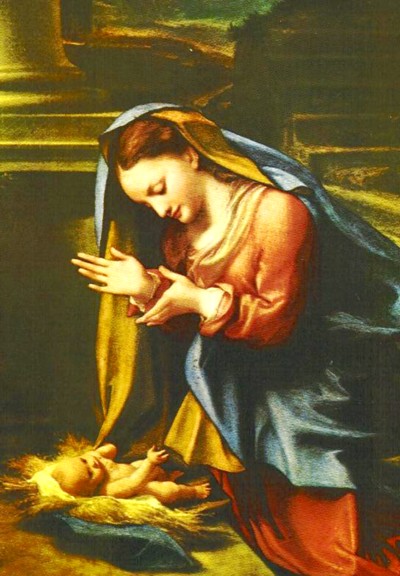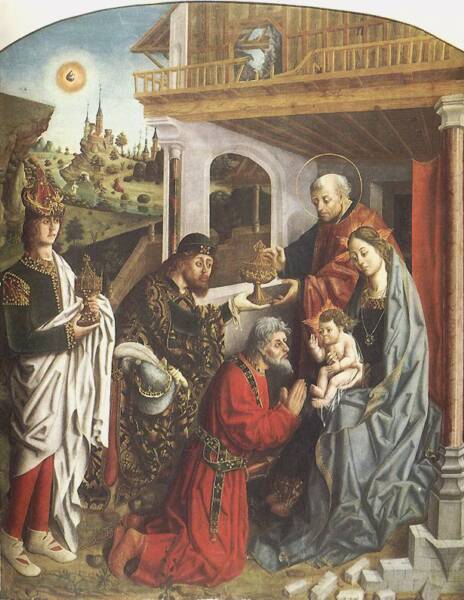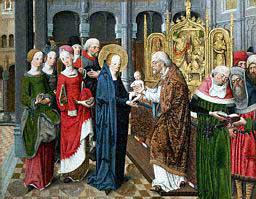FRANK AND THE MOTHER OF GOD
No other Caroline Divine gave to Mary the honour that Mark Frank did, not even Andrewes. It is obvious that Frank looked upon Our Lady with loving devotion, and saw her as pure and immaculate and conceived without corruption. Thus he followed the Fathers who often spoke of Mary as “the most pure and immaculate Virgin” and “without stain of sin.” Next to her Son, she is the purest of all God’s children. This is evident as the beginning of the second Christmas sermon.
I shall not need to tell you who this ‘she,’ or who this ‘him.’ The day rises with it in its wings. This day wrote it with the first ray of the morning sun upon the posts of the world. The angels sung it in their choirs, the morning stars together in their courses. The Virgin Mother, the Eternal Son. The most blessed among women, the fairest of the sons of men. The woman clothed with the sun: the sun compassed with a woman. She the gate of heaven: he the King of glory who came forth. She the mother of the everlasting God: he God without a mother; God blessed for evermore. Great persons as ever met upon a day.
In his Lady Day sermon Frank manifested what he felt was the correct approach to the blessed Mother.
Give we her in God’s name the honour due to her. God hath styled her ‘blessed’ by the Angel, by Elizabeth; commanded all generations to call her so, and they hitherto have done it, and let us do it too. Indeed, some of late have overdone it; yet let us not therefore underdo it, but do it as we hear the Angel and the first Christians did it; account of her and speak of her as the most blessed among women, one ‘highly favoured,’ most ‘highly’ too. But all the while give Dominus tecum all the glory, the whole glory of all to him; give her the honour and blessedness of the chief of the saints, - him only the glory that she is so, and that by her conceiving and bringing our Saviour into the world we are made heirs, and shall one day be partakers of the blessedness she enjoys, when the Lord shall be with us too, and we need no angel at all to tell us so.
 | ||||||
We are indeed fortunate to have the extant sermons that Frank preached at the Marian feasts and others that have some association with the blessed Mother as it enables us to appreciate Marian devotion through the eyes of this Caroline divine. Although not the first feast liturgically, the obvious starting point is the Annunciation. Lady Day as it was known in England honoured of course Our Lady. It is only since 1970 that this Feast has become known as the Annunciation of the Lord. The old association of the 25th March is evident as Frank began his sermon for this day.
In this sermon for Lady Day Frank depicted Mary as being well-favoured and endowed with grace in order to fulfil her vocation.
Blessed she indeed that was the conduit of so great blessings, though blessed most in the bearing him in her soul, much more than bearing him in her body; … Blessed in her going out and in her coming in, the Lord still being with her; the good treasure of heaven still open to her, showering down upon her, and the earth filled with the blessings, which she brought into the world when she brought forth the Son of God; … She is highly favoured enough that her Lord and Son is with her and she with him: she would be no higher sharer.
But more favoured is she for her humble spirit:
Blessed is the virgin soul, more blessed than others, in S. Paul’s opinion; blessed the humble spirit above all. For God hath exalted the humble and meek, the humble handmaid better than the proudest lady, Blessed the devout affection that is always watching for her Lord in prayer and meditations; none so happy, so blessed, as she; the Lord comes to none so soon as such.
She was an immaculate and unspotted virgin: and to whom do virgins’ chambers lie open at midnight but to angels? God sends no other thither at that time of night; and that that time it was, may well be conjectured from Wisdom xviii:14-15: ‘When all things were in quiet silence, and that night was in the midst of her swift course, thine Almighty Word came down from heaven;’ then, it seems, was the time of her conception, - of Christ’s coming to her; before whom immediately the Angel came to bring the message that he was a-coming, if, as S. Bernard says, he were not come already.
Frank also explained how useful it was for Lady Day to fall sometimes in Lent, and how a feast of joy and “surely no fasting work” could be kept appropriately at such a time. It is because this feast is like a beacon at that solemn time when the Christian is reflecting on sin and expressing sorrow for it. “So it can never come more welcome to us, than even then when we are sighing and groaning under them; never can angel come more acceptably than at such time, with such a message as ‘All hail, thou art highly favoured, blessed art thou.’”
Although Christmas is specifically not a feast of Mary, but without her it would not be a feast at all Frank insisted. Indeed “the whole business” of Christmas “is between two persons, the mother and the child”. In Bethlehem “this blessed Mother’s time [was] accomplished, … and then ‘she brought forth her first-born son’” to which Frank invites us to “come” and “see what God has sent us”. We shall discover “a mother and a child, swaddling-clouts to wrap it, and a manger for a cradle to lay it in.” He posed if Christ was to “be born of a woman” why did He choose “a poor carpenter’s wife?” Surely “some great queen or lady had been fitter far to have made as it were the Queen of Heaven, and Mother to the heir of all the world.” Instead God chose “the lowliness of this his holy handmaid that he looked to; it was for her humility he chose to be born of her before any other, that we may know” that He “the Eternal Wisdom” deemed to live with “the humble and lowly.”
Frank very devotedly weaved the loveliness and purity of the Virgin Mother with the humility of “the only-begotten Son of the Immortal God to become the first-born of a mortal woman. … Eternity a Child, the rays of glory wrapt in rags, Heaven crowded into the corner of a stable, and he who is everywhere wants a room.” Everything about that first Christmas morning exudes lowliness. Mary only had “swaddling-clouts to wrap” her Child and “a manger for a cradle to lay” Him in. Yet we can learn from “his happy mother how to wrap, and where to lay him.” Thus from both Mary and her Child we learn so much about humility.
‘And she brought forth.’ ‘Before she travailed she brought forth; before her pain came she was delivered of a man child;’ so prophesies Isaiah, and so the Fathers do apply it. She conceived without corruption, and brought forth without sorrow; … No women, it seems, near to help her: for she who needed not the help of man to conceive, needed no help of woman, sure, to bring forth: no corruption, no sorrow.
This in itself is “a great mystery – none ever like it,” stated Frank. Thus Christ is born by the coming together of “that pure Spirit [and] … of the purest blood and spirits of the purest virgin of the world.” Christ’s birth happened “without the least hurt to [Mary’s] virginity.”
At Epiphany the Church celebrates the journey to Bethlehem of the Magi who found the Babe “‘with his mother’ too - Christ and the devout soul together, Christ and the soul united, to find him and ‘Mary’ together.” In the lowly stable Frank depicted the Blessed Mother as centre stage nursing the blessed Infant as the Magi arrived and worshipped Him in “the glorious Virgin’s lap”. This Frank depicted like a “shrine and altar”. He also honoured Mary by comparing her to the purity of the gifts offered by the Magi. Accordingly she is pure as the gold and “without stain of sin.”
Candlemas, forty days after Christmas, is when Mary is purified “according to the law of Moses.” She and Joseph took Jesus “to Jerusalem” and “present him to the Lord.” Frank paid her an endearing compliment when he stated that Christ was brought for His presentation “by a virgin; and I know not how he can be brought by any better.”
As far as Frank was concerned Mary did not need any purifying from child-birth. How could she when she is “pure and immaculate.” Yet she fulfilled the Law, just as her Son did, as this “is God’s method.” Yet Holy Mary’s offering in paying her dues was that of a poor person - “two turtle doves”. This in a sense was like “ransom money” for her “first-born” came to redeem. However as poor as that offering was, it was an adequate expression for the “safe birth” of the Child Jesus and her “safe deliverance”. So Mary’s offering from “the poor” has sanctified “poverty to the poor” and has henceforth made it “an acceptable service unto God.” So if Mary could not offer any rich offering to God we should not despair if our offering is poor.
Frank certainly revered the blessed Mother as immaculate and without any stain of sin as did the early Fathers. Their teaching was enshrined in the proclamation at the Council of Ephesus in 431 when Mary was officially spoken of as Theotokos, the God bearer., but remembering it was given to defend the two natures of Christ against Nestorius and others.
Marianne Dorman
Returned to Frank's page




